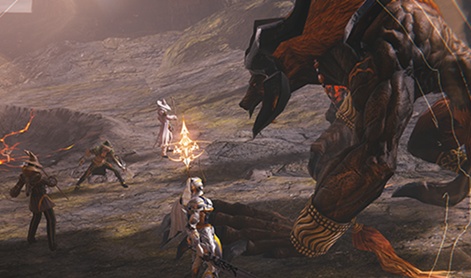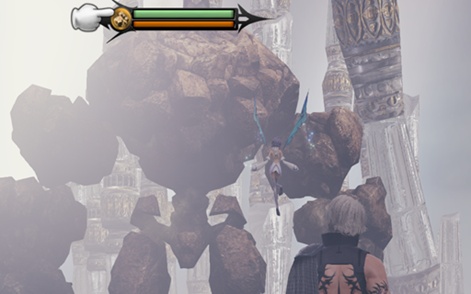It's often said in the world of free-to-play development that launching a game is the beginning, not the end.
These aren't boxed products released onto shop shelves, never to be worked on again. These are games-as-a-service that require constant operation and updating, often over a period of several years.
PocketGamer.biz has long been investigating the Making Of notable games soon after their launch, but what happens long after a game is released?
In an attempt to find out, this regular feature will talk to the developers behind maturing live games about their experience so far. You can read all previous entries here
In this entry, we discuss episodic mobile RPG Mobius Final Fantasy with Square Enix Producer Yoshinori Kitase and Heads of Global Operations Hajime Umemura and Takashi Shiraga
The title was first launched in Japan back in 2015, but got its full worldwide released on August 3rd 2016.
PocketGamer.biz: Now that Mobius Final Fantasy one year old, how do you reflect on its performance thus far - from launch to the mature title it has now become?
Yoshinori Kitase: Mobius Final Fantasy’s exact birthday is August 3rd, with the anniversary campaign beginning on August 1st. As the first Square Enix directed mobile title on a global scale, I truly feel that we were able to improve the playability and quality of the game with our players.
About how large is the team currently handling live ops on Mobius Final Fantasy?
The development team size is comparable to some console titles. It’s comprised of the core operations team (roughly 10 people) who directs daily operations.
Furthermore, about five people from our marketing and community teams, who serve as the point of contact with our players, work alongside an outsourced team to support live operations.
How important do you consider customer support and updates to be? How have players responded to significant updates?
Hajime Umemura: We place a lot of importance on customer support and updates. We are constantly reviewing player feedback and do our best to respond through continuous updates. Our approach is slightly different to when we developed console games, and I believe there is a positive response towards each update.
The memory restrictions on mobile devices are quite severe, and on numerous occasions we needed to forego certain inclusions.Hajime Umemura
On the other hand, the memory restrictions on mobile devices are quite severe, and on numerous occasions we needed to forego certain inclusions.
For example, during the February Final Fantasy VII collaboration event, we wanted to let the player view the story outline and cut scenes whenever they wanted after the event ended.
However, we realised that the ever-increasing data size deemed it necessary to have these features removed as it would ultimately affect regular gameplay. Perhaps some players will feel disappointed after hearing this!
What steps have you taken to ensure that Mobius Final Fantasy maintains a sizeable and active player base all this time after its launch?
Takashi Shiraga: We hold meetings every week to check on content progression and make changes to various initiatives. We check on the content progression and activities, as mentioned, and adjust the content release dates so that there is constantly something to talk about. We also shift activities that are more newsworthy to dates that offer the maximum impact.
Of course, we not only adjust in-game content releases, but also release information quite frequently to our players through various outlets, such as our community site.

We regularly post job introduction videos and content introduction articles for our community, and also release push notifications to inform players when new content begins - as well as occasionally have fun with the messages.
It’s all hard work, but we have fun finding ways to engage with our players on a day-to-day basis.
How does being part of a franchise like Final Fantasy affect your strategy? Do you try work to capitalise on other new game/media launches within the franchise?
Mobius Final Fantasy achieves high quality graphics that exceed most titles on mobile devices. As such, we are able to recreate the high quality of Final Fantasy console titles, such as Final Fantasy XIV, Final Fantasy XV and Final Fantasy XII: The Zodiac Age on mobile devices. This is something we have not seen any other mobile title.
North America and Europe are important markets as they maintain the top share in both revenue and numbers of players, on par with Japan.Takashi Shiraga
For the recent Final Fantasy VII Remake collaboration event, the enemy 'Guard Scorpion' made an appearance prior to the main game that was not yet released.
The actual 3D CG model data for Final Fantasy VII Remake was used for this purpose. We were able to achieve the world’s first collaboration with Final Fantasy VII Remake thanks to the graphical capabilities of Mobius Final Fantasy.
Are you able to share any KPIs for Mobius such as total downloads, DAU or retention?
In January, the game achieved 10 million downloads worldwide, but the number of downloads have continued to increase by the millions since then.
North America and Europe are particularly important markets as they maintain the top share in both revenue and numbers of players, on par with that of Japan.
What lessons have you learned/are you still learning from Mobius Final Fantasy? Is there anything about the game that, in hindsight, you might have handled differently?
Yoshinori Kitase: Final Fantasy players tend to largely look forward to the “story experience” and the “world experience” when it comes to games, and we have come to clearly understand that the experiences they seek are different from those sought after by other mobile gamers.
In relation to the story, episodes are released once every one to two months, but if we are able to maximise our production to match the speed Final Fantasy players seek, perhaps we would be able to generate results that are further satisfying.

Takashi Shiraga: I feel like live ops titles are similar to living creatures in that they gradually change form. Developing the title isn’t the end, and the title will continuously be worked on long after the game is released.
We learned that it is important to have the mindset to strive to develop something better while communicating with players and always being on the lookout for our game.
I feel like live ops titles are similar to living creatures in that they gradually change form.Takashi Shiraga
Furthermore, the game balance is also changing gradually. For example, when we implement new features, we would alleviate some of the older features for our new players, so the sense you get from playing the game largely differs from when the game initially launched.
Even so, we still need to guarantee a consistently fun and enjoyable experience for all players (both beginners and core players). This is extremely difficult, but it’s definitely worth learning and figuring out.
Finally, how has your experience with Mobius Final Fantasy informed where you are and what you are working on now?
The Final Fantasy titles in the mobile market were mainly ports of past games, anthology-type titles, or casual puzzle-based releases, so I am extremely proud that we were able to release Mobius Final Fantasy into the mix as an all-new title in the Final Fantasy franchise.
The development team learned how to develop high quality content in quick cycles from their experience developing Mobius Final Fantasy.
Currently, many of the development staff, including myself, are involved with the production of Final Fantasy VII Remake. Our platform changes to the PlayStation 4, but we will surely make use of our experience.
















